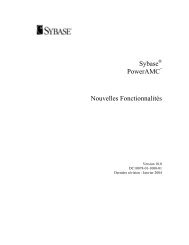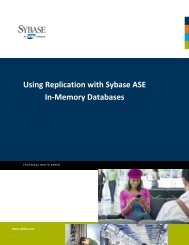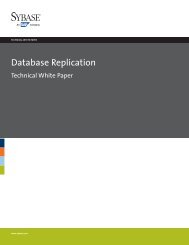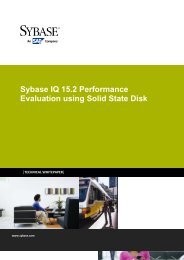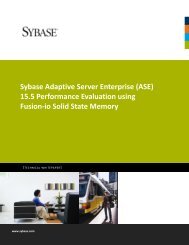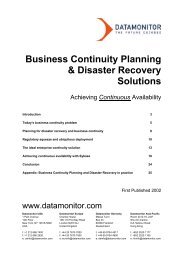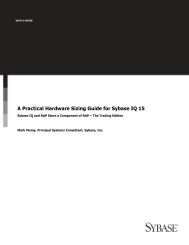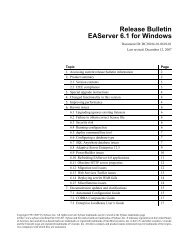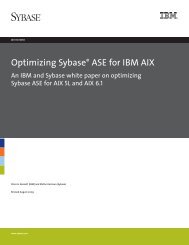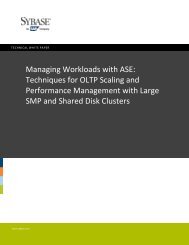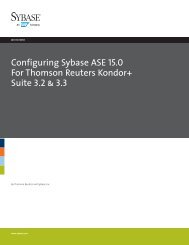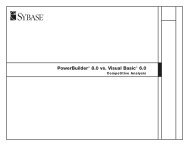ASE ODBC Driver and OLE DB Provider Migration Technical - Sybase
ASE ODBC Driver and OLE DB Provider Migration Technical - Sybase
ASE ODBC Driver and OLE DB Provider Migration Technical - Sybase
Create successful ePaper yourself
Turn your PDF publications into a flip-book with our unique Google optimized e-Paper software.
When the primary server doesn’t response in the amount of time specified by LoginTimeout, the driver attempts to<br />
connect to server2:port2, <strong>and</strong> so on, until it connects successfully or exhausts the list.<br />
For information regarding the <strong>ASE</strong> Cluster Edition support refer to the New Features Open Server <strong>and</strong> SDK 15.0 for<br />
Windows, Linux, <strong>and</strong> UNIX document, under ESD#12.<br />
Server Name [secondaryserver/SecondaryServer]: The name or the IP address of the <strong>ASE</strong> server acting as a failover<br />
server in an active-active or active-passive setup.<br />
Server Port [secondaryport/SecondaryPort]: The port number of the <strong>ASE</strong> server acting as a failover server in an<br />
active-active or active-passive setup.<br />
Directory Service Information: This panel is used for alternate methods of determining the host <strong>and</strong> port for <strong>ASE</strong><br />
connectivity. This option allows for the use of an LDAP server or the interfaces file (SQL.INI for windows, interfaces<br />
for LINUX).<br />
URL [dsurl/DSURL]: The URL for the LDAP server, or the location to the interfaces file. Some examples are:<br />
LDAP: ldap://hostport/dn[?attrs[?scope[?filter[?userdn?userpass]]]]<br />
ldap://pvero-xp:389/dc=sybase,dc=com??one?sybaseServername=ase1252<br />
Interfaces: file://[path][?][servicename]<br />
file://C:\sybase\ini\SQL.INI<br />
Service Name [dsservicename/DSServiceName]: The Service Name of the LDAP <strong>Sybase</strong> server object. The default is<br />
an empty string.<br />
User ID [dsprincipal/DSPrincipal]: The user name used to authenticate on the LDAP server, if the LDAP server does<br />
not allow anonymous access. The principal can be specified in the DSURL as well.<br />
Use Quoted Identifiers [quotedidentifier/QuotedIdentifier]: Specifies if <strong>ASE</strong> treats character strings enclosed in<br />
double quotes as identifiers:<br />
•0 = do not enable quoted identifiers (default)<br />
•1 = enable quoted identifiers<br />
Set ANSI Null [ansinull/AnsiNull]: Strict <strong>O<strong>DB</strong>C</strong> compliance where you cannot use “= NULL.” Instead, you must use<br />
“IsNull.” Default is checked. Uncheck this if you use the “=NULL” in your SQL statements, especially the where clause.<br />
(Default =1)<br />
Enable Dynamic Prepare [dynamicprepare/DynamicPrepare]: When set to 1, the driver sends SQLPrepare calls to <strong>ASE</strong><br />
to compile/prepare. This can boost performance if you use the same query repeatedly. (Default =0)<br />
Normalize Unicode Strings [normalizewcharparams/NormalizeWCharParams]: Under certain circumstances, when<br />
the <strong>ASE</strong> is configured with “enable unicode normalization” set to 0, problems might occur with parameters set to TDS_<br />
LONGBINARY. Setting this property to “1” will send the parameters as TDS_VARCHAR. Problem occurs with possible<br />
error like:<br />
“Attempt to insert NULL value into column ‘column name’, table ‘table name’; column does not allow nulls. Update<br />
fails.”<br />
Originally discovered with use of Microsoft Replication. (Default=0)<br />
Cumulative Record Count [crc/CRC]: By default, the driver returns the total records updated when multiple update<br />
statements are executed in a stored procedure. This count will also include all updates happening as part of any<br />
triggers set on an update or an insert. Set this property to 0 if you want the driver to return only the last update<br />
count. (Default = 1)<br />
13



